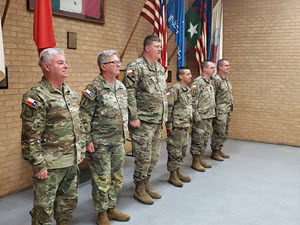By David D. Brown, 1LT, Texas State Guard
 AUSTIN, Texas - For service members in the Texas State Guard, an eagerness to serve fellow Texans during times of emergency is a prerequisite. Yet that alone does not make a professional force. To be “Equal to the Task”, as its motto says, members of the Texas State Guard are constantly engaged in professional military education.
AUSTIN, Texas - For service members in the Texas State Guard, an eagerness to serve fellow Texans during times of emergency is a prerequisite. Yet that alone does not make a professional force. To be “Equal to the Task”, as its motto says, members of the Texas State Guard are constantly engaged in professional military education.
But who trains the trainers?
That’s the job of BIC: the Texas State Guard’s Basic Instructors Course. The course is an intense and demanding five days of learning how to effectively teach fellow soldiers. The objective of the program is to make sure instructors in the Texas State Guard are helping maintain a high state of mission readiness. It is one of many specialized professional education programs provided to soldiers in the nation’s premier state guard force.
“I’ve attended several training events before and this was the most stressed I’ve ever been, but the course was so rewarding,” said Sgt. Jason Zachman of Lubbock, a student in the March 2022 BIC class at Camp Mabry in Austin. Zachman, a volunteer firefighter in the business of building and selling fire trucks and ambulances, is a Texas Emergency Tracking Network (TETN) instructor in the Texas State Guard’s 1st Brigade (North Texas).
Zachman was one of six graduates of the March class. Others included Lt. Col. Mark Carey of Georgetown, Cpl. George Dollaway of Round Rock, Sgt. First Class Jared Dugger of Austin, Staff Sgt. Roy Patterson, of Lubbock, and Staff Sgt. Shawn Villareal of San Antonio.
“The Basic Instructor Course standardizes all lesson plans to create consistency across the Texas State Guard training courses and programs,” says Chief Warrant Officer John Harrison Watts, the Officer-in-Charge of BIC training. “If a student were to sign up for this course outside of the Texas State Guard, it would cost upwards of $500 to take it.”
According to Watts, selected Texas State Guard classes taught by BIC-certified instructors can be used as advanced standing credits at Texas institutions of higher education, including Kilgore College and Tarleton State University. College credit and tuition assistance are among the many important benefits of Guard membership. Such benefits speak to the value the Texas State Guard places in ongoing education.
“We’d be in the classroom learning instructional methods all day, get back to our hotel at 10:30 at night, then spend four or more hours doing our homework and preparing a 30-minute lecture with PowerPoints for presentations the next day. We might get 45 minutes of sleep…” Zachman said.
Student presentations were critiqued and graded by instructors and fellow students, followed by more classes aimed at fine-tuning teaching skills - and then the cycle of lesson planning and presentations would start all over again. Each student completes four presentations, culminating in a 30-minute presentation on a relevant Texas State Guard topic, such as “Recruitment for Non-Recruiters” or “Proper Uniform Protocol”. Students prepare prototype lesson plans from scratch, which are a graded part of course completion requirements.
Training is a centerpiece of the Texas State Guard, whose members have responded to hurricanes, floods, search and rescue operations, a pandemic, and countless other emergencies statewide for more than 80 years. As one of three branches of the Texas Military Department (along with the Texas Army National Guard and the Texas Air National Guard), state-of-the-art training is imperative so that troops can answer the call to serve civilian officials during emergencies, often at short notice.
“Out here in west Texas, you might have to drive several hours to Dallas or Austin to get the training you need,” and BIC certification makes it possible for more coursework to be offered locally, Zachman said. “As a student, I’ve always just been handed a syllabus. BIC gives you a new appreciation for the demands of lesson planning and the art of teaching. It was a challenge to get out of my comfort zone.”
The Texas State Guard BIC program is similar to teacher training offered by Texas law enforcement and emergency management agencies. It is a complement to a battery of coursework from the Federal Emergency Management Agency and other specialized training required of Texas State Guard instructors.
Many soldiers in the Texas State Guard consider professional training opportunities one of the important benefits of service. A full description of the benefits of Texas State Guard membership, as well as contacts for recruitment, can be found online at tmd.texas.gov/state-guard.